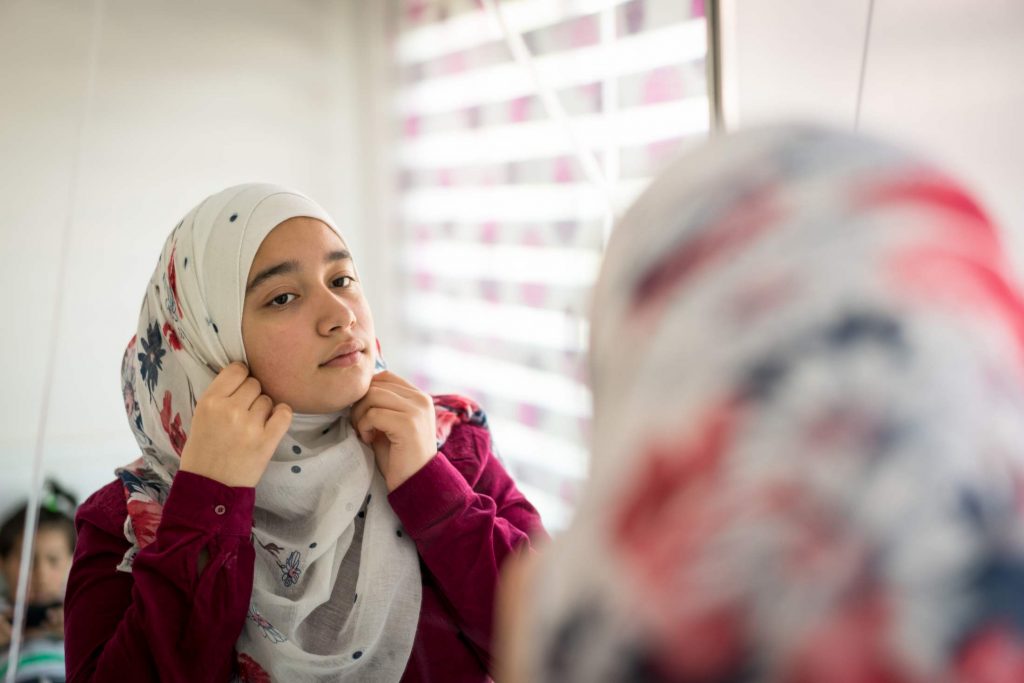“An hour? It takes you an hour to do your make up every day?”
I laughed embarrassedly as my friend teased me, his tone only half serious and the other half playful .
“You could have a talent. You could use that hour every day to learn a new language or play the violin. You could be that cool girl that plays the violin!”
“I’d be the ugly girl that plays the violin.”
My friend did not get it. This conversation had taken place a couple of years back, before I was practicing and, yes, when I really did spend at least an hour daily applying my makeup.
I had a special routine, you see: eyes, face, under eyes, eyebrows, cheeks and lips. Painting each facial feature would take at least 10 minutes, and every foundation-brush stroke had to be just right.
Thinking about it now makes me shudder with shame, what an unbelievable waste of time trying to supposedly “correct” something that was not wrong in the first place…
I recently read an article in an Islamic magazine in which a sister asks why we ladies bother to wear makeup. Evidently, the sister in question doesn’t see the need for any kind of cover up but her hijab, mashAllah.
As I read the article, however, I felt a strange mix of feelings; a sense of humiliation, of hurt and of childish petulance came over me.
Though the language the sister was using in the article was aiming to be empowering, I felt as I was being chastized, told off for a bad habit that I had very little control over (– or so I thought).
What Does “Ugly” Mean?
Here’s where the problem lies: EVERYTHING in our society tells us that we are ugly.
I’m not talking so much about the media’s mix of blatant and subliminal messaging, with those Maybelline billboards that wonder if ‘maybe she’s born with it’, whilst clearly suggesting that she’s probably not.
I’m speaking of our own personal communities of friends and family that literally tell us that if we are not prettying ourselves with cosmetics, there is something very wrong.
Many of us have experienced that awkward moment when you are asked, not out of spite or cruelty, but out of genuine concern from the enquirer, why you look so tired, sullen and unwell?
Then, with a deep red flush creeping up from your neck into your bare face, you are forced to tell the truth: ‘because I’m not wearing makeup today…’
This is the exact reason that for so long I felt makeup was not just a fun, once-in-a-while treat I liked to indulge in when visitors came around, but as a daily necessity.
It was as important as brushing my teeth and certainly more important than praying my five daily prayers in those ignorant years when I wasn’t practicing, may Allah forgive me.
And this is why that article I read, with the innocent intention of encouraging sisters to love their natural beauty just as the author does, twisted a nerve inside of me. This sister was right, and I knew it, but my shame in knowing I was wrong caused me to become defensive.

Love Your Natural Beauty
From my own experience I can tell you this because, here’s an example: I think my sisters in Islam are beautiful. I think women are beautiful; especially without makeup.
Of course, when you consider what I have said about my own cosmetics habit above, this seems utterly paradoxical, I’m sure. But, in all honesty, a clean face, a happy smile and a sweet salaam are all that is needed to see someone as beautiful.
Often, what we see in others is not reflected in the mirror when looking at ourselves.
In the noble Quran, Allah tells us to ‘speak to them words of appropriate kindness’ (An-Nisa 4:8). Although this sweet extract is with regard to relatives, orphans and the needy, perhaps there is another lesson to be taken from this short excerpt.
Earlier I mentioned the blinkered vision of women, how we have the strange ability to look at each other with complete admiration and look at ourselves with utter disappointment.
So perhaps, when the Creator tells us to speak to the weak among us with ‘appropriate kindness’, which could perhaps be interpreted as softly spoken truth, maybe we should be applying this softness when approaching our own weak selves.
Let’s be realistic; would you have the strength sister, to stop wearing make-up completely? Bare faced at home, at work, with friends and with family?
In addition to this, could you carry out the even harder task of feeling, thinking and voicing only the kindest thoughts about yourself at all times?
Honestly, I’m not sure I could either.
But let us not resign ourselves to failure, and take on board the advice of the All Knowing, Who tells us in His noble book to: ‘seek Allah’s help with patient perseverance and prayer.
It is indeed hard except for those who are humble’ (Al-Baqarah 2:45): a perfect piece of advice for every trial.
First published: November 2013

